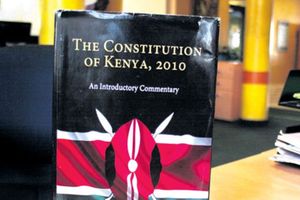
Cabinet Secretary for Interior and National Administration Kithure Kindiki when he appeared before the National Assembly Committee on regional Integration at Continental House Nairobi on March 21, 2024.
I can state with near certainty that Prof Kithure Kindiki will pretty soon be installed as Deputy President once the legal challenges mounted by his impeached predecessor, Rigathi Gachagua, are exhausted.
As he takes his oath of office, Prof Kindiki should be keenly aware that he will be the 13th occupant of the slot a heartbeat away from the presidency, as weighed against just five who have served as Numero Uno since Kenya attained independence in 1963.
An examination of the high turnover will show that he is entering a revolving door.
And that is what he must be extremely careful about. The deputy presidency in Kenya comes with presumptions that the holder will eventually succeed to the State House office and residency.
Prickly relations
If the law professor keenly studies the histories of his predecessors, he will find many instances of prickly relations between president and deputy. Most often, suspicion and mistrust reaches boiling point when an ambitious deputy who boasts a large regional power base displays ambition and impatience, which unsettles an insecure boss.
The story of President William Ruto and his deputy Gachagua provides a very topical and current illustration of what can go wrong; as does the previous tale of former President Uhuru Kenyatta and his deputy of two terms, none other than Dr Ruto.
Prof Kindiki could even go back to the beginning, so to speak, and look at President Jomo Kenyatta and his first Vice-President Oginga Odinga and third VP Daniel Moi. He can also look at President Moi and his first two deputies, Mwai Kibaki and Josephat Karanja.
There is one thread that should interest him: Kenya has since independence been ruled by presidents hailing from only two regions—the Rift Valley and Mt Kenya. Or, more precisely the Kikuyu and Kalenjin power elite exchanging the baton between themselves.
Whenever the President has been Kalenjin, he has in almost all instances felt constrained to have a deputy, and presumptive successor, from the more populous Mt Kenya region.
President Moi had Kibaki, then the short-lived Karanja followed by Prof George Saitoti, who traversed between Kikuyu and Masai heritage.
Throughout those periods Moi needed Mt Kenya to consolidate his hold on power, but at the same time displayed extreme paranoia on schemes, real and imagined, that a deputy controlling a powerful ethnic constituency might be hatching to displace him. He therefore made it a priority to cut the feet from under his deputy, effectively using hirelings from the same community.
Ruto is a keen student of Moi’s byzantine ways. He needed the aggressive Gachagua, in preference to the more genteel Kindiki, to take the fight to Uhuru. Now he has turned back to his initial preference, but will be watching him closely.
Prof Kindiki will find himself in a tight spot when even without his bidding, Mt Kenya politicians start to gravitate around him. There will be many out to project him as the focus of their political and business interests, and ultimately as the community’s route back to the pinnacle of power.
And having succeed Mr Gachagua who was kicked out after trying to establish himself as the Mt Kenya kingpin, to whom President Ruto must be beholden, the law professor will be in a situation where he must move swiftly to claim regional dominance for himself.
With Mr Gachagua keen to exploit as his political trump-card the sympathy he has earned in the region, he will push the narrative that Mt Kenya politicians who were used to kick him out and those benefiting from his travails are traitors.
Suspicion
To counter that, Prof Kindiki must of necessity move strongly to bolster his own position. Trouble is that the more he assumes control of the wider Mt Kenya region, the more President Ruto and other leaders in the Kenya Kwanza mix will view him with suspicion.
As President Moi once famously said, the job of his deputy is to sing after him, like a parrot. Prof Kindiki will be in an unenviable situation where he is expected to win back the mountain for President Ruto, but display no ambition or be seen trying to amass political clout of his own. Damned if he does, damned if he doesn’t.
Then there are signs that President Ruto, like Uhuru before him, is trying to wean the country away from the Kikuyu-Kalenjin presidential duopoly. That could make well make Kindiki a stop-gap appointment. Those positioning themselves in the Kenya Kwanza succession race, including opposition leader Raila Odinga and Prime Cabinet Secretary Musalia Mudavadi will be watching with keen interest.
[email protected], @MachariaGaitho













